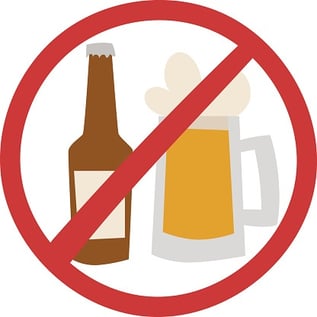 The curiosities of the human body never cease to amaze. Today’s topic is alcohol and its effect on fitness performance. Seems like a fairly straightforward and easy concept to grasp, but just as I find more details there seems to be more head scratching, mostly from the historical aspect and how we have evolved to today’s ideals.
The curiosities of the human body never cease to amaze. Today’s topic is alcohol and its effect on fitness performance. Seems like a fairly straightforward and easy concept to grasp, but just as I find more details there seems to be more head scratching, mostly from the historical aspect and how we have evolved to today’s ideals.
It’s no secret that alcohol can trigger several spiraling ailments, ranging from liver disease to heart issues, in addition to the obvious weight gain and stunting of muscle development. That being said, with so much knowledge about the negatives of alcohol abuse, why would an individual not want to become independent of all the risks and dangers? The answer is not so easy to discern, but we can at least look at some of the more alarming facts.
The Health Impacts of Alcohol Abuse
The aforementioned alcohol-induced liver disease, also known as cirrhosis, is the result of abuse over a long period of time. Not everyone gets to the point of cirrhosis, but there are many other, smaller monsters that can arise (Kuzma, 2015) from your head to your toes:
- Brain function can become unreliable.
- Decision making abilities are limited.
- Your looks can diminish due to blood vessel ruptures and swollen or puffy skin.
- The heart works harder to do what it normally does.
- Circulation is impaired.
One of the main things to remember is that alcohol acts as a diuretic, which can lead to fluid loss. Dehydration is not exactly the most welcoming environment for muscle development. Dehydration also leads to muscle fatigue. Earlier, I mentioned that you can gain weight from alcohol. This is twofold: number one, alcohol is not a calorie-free substance; and number two, we tend to eat more junk when we drink. They go nearly hand in hand. Finally, we see a hindrance in protein synthesis, the foundation of all our hard work toward Gainz. (Hanes, 2014)
Is a Little Alcohol Okay?
Now you may say, “Thomas, why does everyone keep saying that it’s okay to have a small amount of alcohol for good heart health?” Well, simply put, there are studies that have linked light/moderate alcohol consumption (like one or fewer drinks per day) with heart health. There are some catches, though. The studies found that the benefits did not help everyone; for example, those under 45 had less positive impact, younger women could have a higher risk for breast cancer, and people with hereditary alcoholism issues would not be advised to start drinking just because of this study (Gupta, 2008).
Educate Yourself About Alcohol Effects
Alcohol is not going away anytime soon. It’s part of many cultures around the world and has been for thousands of years. However, the people who are trying to get fit and stay healthy for life deserve to be educated on the topic so that they can give their body a better chance to succeed.
Those with concerns about leaving alcohol behind can rest assured that fitness and wellness programming will not leave you behind, whether you are relieving stress, making friends, or aspiring for greatness.
For a better understanding of how alcohol affects your body, please contact the NIFS Registered Dietitian, Angie Mitchell.
Until next time… Muscleheads rejoice and evolve!
THOMAS LIVENGOOD
This blog was written by Thomas Livengood, Health Fitness Specialist at NIFS. To find out more about the NIFS bloggers click here.

